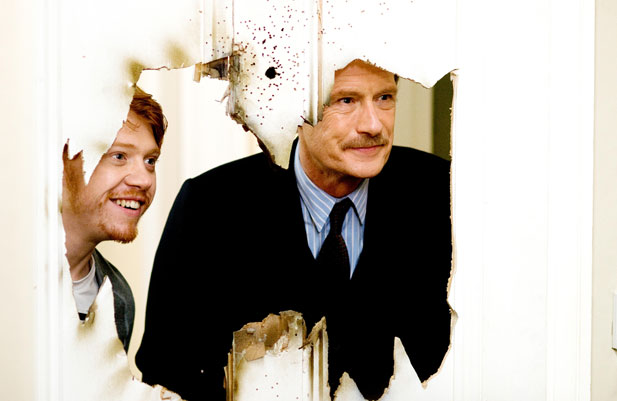
Wild Target was a refreshing exercise in forms; it’s almost like a comic strip or animated feature made entirely out of character sketches. But what’s so marvelous about it, is that, like a Scott McCloud insists, the lack of solid identity on the part of the character creates just the right space for us to insert ourselves into the story.

So, in conversation with my friends, I’ve been summarizing the film like this: a middle-aged hit man falls in love with his kleptomaniac target who has soured a deal with a vicious art collector played to a tease by Rupert Everett. And the guy from Hitchhiker’s Guide to the Galaxy plays the second hit man hired to finish the job; he has unnaturally big bright teeth which I suspect of being false. Oh, and the first hit man’s mother gets involved to save the family honor—wielding a Hitchcockian knife, no less. Ta-da!
What makes the film so delightful is its abruptness and its total lack of commitment to its own story. It rather unceremoniously unwinds with no rush, no hurry—peppered with a little action to keep the flavors nice. Its rather like a lovely stew set to simmer for hours, marinating in its own premise; stir occasionally to make sure it doesn’t stick to the pan.
At first I felt as if the film had no idea what it was doing. It kept cutting into the scenes at the wrong moments—for example, it cuts from a “love scene” involving foot massage to a knife crashing down into the pillow beside the “heroine”‘s head. No creepy lead time, with the creaking of the door and stealthy approach the angelic sleeper. Just BAM! But therein lies the joke: watching an eighty-year-old woman ride her scooter into her old bedroom in which a young house guest is in quiet repose just doesn’t quite seem as funny until after that eighty-year-old woman has attacked the young house guest. The whole film plays out this way, the punch line before the joke almost.

And somehow, as it jumps through the hoops—falling in love by watching the heroine from afar, turning the tables in a gun fight, whisking her away to a hotel room for safety’s sake, the utter opposition of their ways of life, her abandonment of their plan at its most necessary hour, the reunion and coming to terms, her clumsy expression of affection, his utter inability to comprehend “love,” and the ultimate test of their newfound romance—somehow as it jumps through all those hoops that make up the formulaic chick-flick, it rises above it. Like an out-of-body experience, it joins you in the heavens and looks down on the pathetic three-act play, passes you the popcorn, and says, “It’s that cute?” And it is.
It is cute. It is cute because it knows that aiming for the human heart is aiming at a wild target. And no movie, however great, should ever suppose itself capable of actually embodying all the crazy vicissitudes and epiphanies of a real person. And because Wild Target embraces that fact and chuckles to itself, you chuckle to yourself, too. And somehow the epic grandeur of “romantic ideals” become a little less heavy to bear and the mundaneness of your own life seems to be just fine and dandy—because, of course, there is nothing mundane about being a person with fears and loves, wounds and regrets, insecurities and heroic impulses all bound up in a single bodily form.
